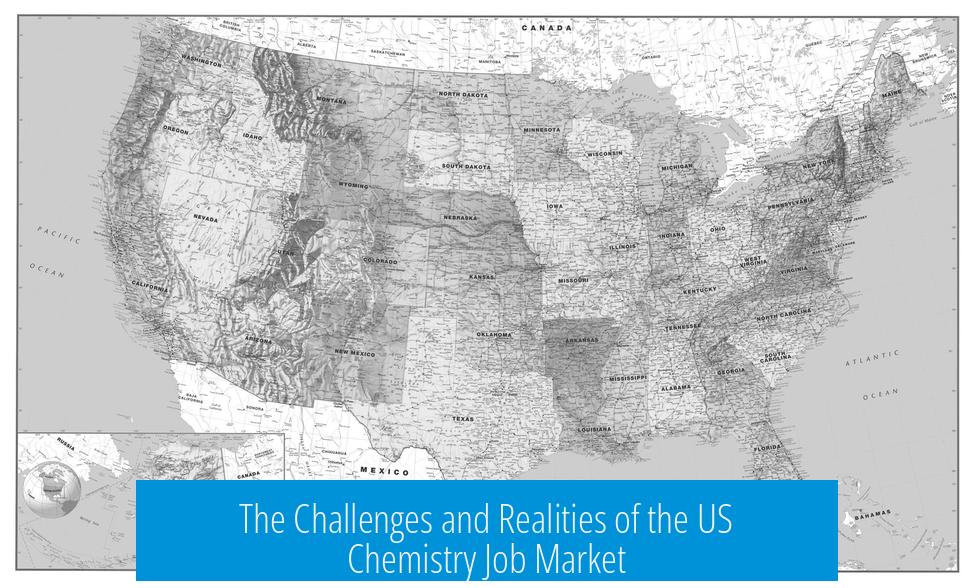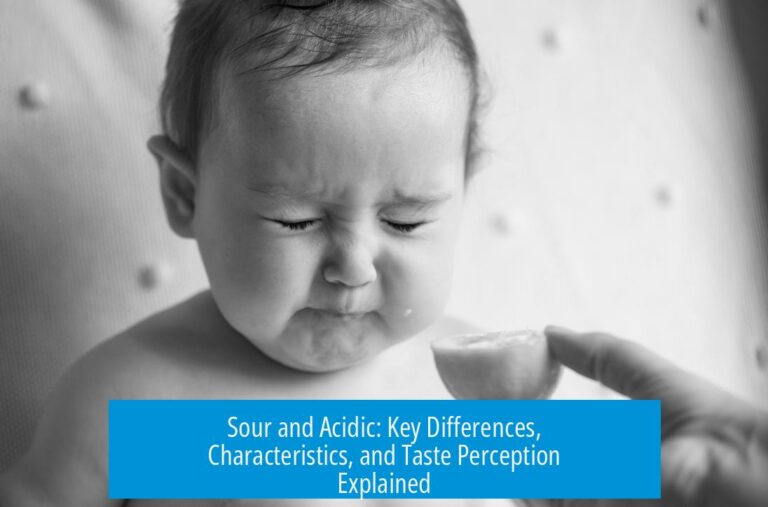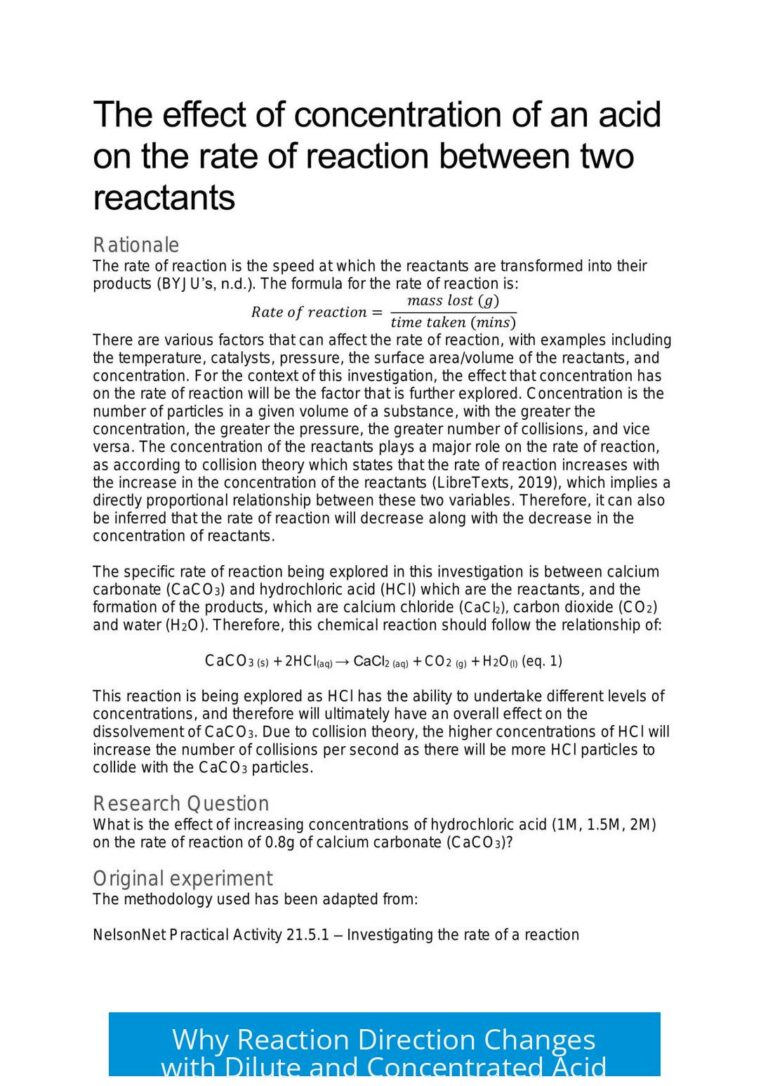Is the US Chemistry Job Market Really That Bad?
The US chemistry job market poses clear challenges, especially for new graduates seeking their first job. Competition is intense due to market saturation and regional disparities. While pay often falls short of expectations and experience heavily influences opportunities, there are niches and career paths where demand remains strong. Success depends on education level, geographic flexibility, skillset, and strategic job searching.
1. Difficulty of Finding the First Job

The first chemistry job is widely recognized as the hardest to secure. New graduates often face prolonged job searches, stretching over months or even years. Experience plays a critical role in easing this challenge. Many early-career chemists report needing to pivot toward adjunct academic positions or unrelated work before landing industry roles.
- First jobs may require geographic flexibility, often in hubs such as Boston or the Bay Area.
- Experience gained during internships or research substantially improves hiring chances.
- Subdiscipline matters; some fields like organic chemistry experience greater difficulty.
Examples illustrate this: one recent PhD graduate spent a year searching; another relocated to the Bay Area and found a position within two months. Location heavily dictates job availability and employer demand.
2. Saturation and Competition in the Job Market
The chemistry profession faces oversupply relative to openings. Universities produce a steady stream of graduates, exceeding the capacity of available industry or academic positions.
- Over 200 applications can be typical for just 2 entry-level roles.
- Competition extends beyond chemists to graduates from biology, biochemistry, chemical engineering, and related fields.
- Hiring freezes and downsizing post-COVID have tightened the job market further.
Despite this, some regions maintain steady openings, particularly in pharmaceutical hubs. However, intense competition means employers increasingly expect candidates who require little training and can deliver immediately.
3. Pay and Compensation Issues

Compensation in chemistry varies widely but generally lags behind other STEM fields such as computer science or engineering. Entry-level wages are often low, leading some chemists to supplement income through other jobs.
| Degree Level | Typical Starting Pay Range |
|---|---|
| Bachelor’s (BS) | $30,000 – $50,000 annually |
| Master’s (MS) | $45,000 – $70,000 annually |
| Doctorate (PhD) | $60,000 – $90,000 initially, with potential to exceed $150,000 later |
Location greatly affects salaries, with coastal urban centers often offering higher pay. Even so, pay rarely aligns with the responsibilities or expertise required for many roles. Contract manufacturing and quality control jobs typically offer lower wages than research and development positions.
4. Job Types and Career Pathways
Chemistry offers diverse roles beyond traditional lab research, but many entry-level jobs focus on technical or quality assurance tasks.
- Common roles: QC/QA analyst, lab technician, blend scientist, instrument technician.
- Niche areas such as radiochemistry or semiconductor manufacturing have more specialized openings.
- Temporary and contract positions are increasingly common as employers seek to evaluate candidates before permanent hires.
- Some chemists transition to adjacent fields such as data science or non-destructive testing for improved prospects.
Securing internships and paid lab work during college provides a significant advantage. For those without network connections or distinctive qualifications, starting as lab technicians remains common.
5. Impact of Location on Job Opportunities

Geography is a decisive factor in the chemistry job market. Certain metropolitan areas have a dense concentration of opportunities:
- San Francisco Bay Area – biotech and pharmaceuticals.
- Boston/Cambridge – research institutions and pharma.
- RTP (Research Triangle Park) – diverse chemical and life sciences firms.
- Minneapolis – food science and chemical manufacturing.
In contrast, rural or non-industrial regions see far fewer chemistry-related jobs. For many, relocation is a necessity. Large companies usually require moving to specialized hubs to access competitive salaries and career growth.
6. Influence of Education Level and Skills
The level of education shapes market prospects. Bachelor’s degree holders face a roughly equal chance of difficulty depending on the field and location. Master’s and PhD graduates usually encounter more openings but often require geographical mobility.
- Employers prefer candidates with robust research experience and a professional network.
- Soft skills like communication and problem-solving are increasingly valued.
- Many recent graduates lack bench skills due to COVID-era restrictions, affecting job performance and employability.
- Universities focus heavily on theoretical knowledge but seldom provide career development training or job searching skills.
Industry prefers candidates who can be productive from day one, making internships and practical experience critical.
7. Market Dynamics and Trends
The job market shifted significantly during the COVID-19 pandemic period. From 2020 to 2022, the chemistry sector experienced an artificial boom in salaries and hiring due to labor shortages.
- This increase led to fewer openings and salary corrections in later years.
- Employers now favor temporary and contract roles to reduce long-term risks.
- Work-from-home policies are generally ineffective for lab-based chemists, and remote preferences can reduce hiring prospects.
Hiring freezes and layoffs among large firms have temporarily slowed chemical industry employment growth, affecting new entrants disproportionately.
8. Anecdotal Perspectives on Market Health
Views on the chemistry job market vary widely. Some report extended unemployment and underemployment, while others advance rapidly.
“The market looks worse than it actually is because unsuccessful candidates vocalize struggles more.” — Industry insider
“After two years searching, I finally got a decent-paying job with great benefits.” — Recent graduate
Many successful chemists highlight the necessity of persistence, adaptability, and networking. Conversely, some leave chemistry for fields like data science or trade work due to frustration or better pay.
9. Advice and Recommendations for Job Seekers
Effective strategies enhance chances in the challenging market:
- Apply consistently: Treat job searching as a full-time job, sending tailored applications frequently.
- Develop skills: Gain internships, lab experience, and soft skills before graduation.
- Network actively: Utilize LinkedIn and industry events to build connections.
- Consider relocation: Target geographic regions with high job density.
- Explore alternative sectors: Semiconductor, cosmetics, and instrument service roles may be less saturated.
- Pursue advanced degrees: If uncertain, obtaining a PhD often leads to better roles and salaries.
10. Data and Market Analysis
Public data corroborate many trends:
- Starting median salary for chemists with a degree is about $42,600, rising to approximately $79,900 after 10 years (source).
- Bureau of Labor Statistics notes median annual wage for chemists around $79,300 in 2022 (source).
- Market challenges stem from supply-demand mismatches rather than lack of career potential.
The data align with anecdotal reports of low starting pay, regional variation, and competition intensity.
Key Takeaways
- Securing the first chemistry job is the most difficult phase; experience and location heavily influence outcomes.
- The market is saturated at the entry level, with many applicants per available job.
- Pay is generally lower than other STEM disciplines and often misaligned with responsibilities.
- Geographic flexibility improves access to higher-paying and stable roles.
- Advanced degrees and practical experience enhance employability.
- Networking and consistent, strategic job searching are critical.
- Industry trends reflect corrections after the COVID hiring surge and a move toward temporary positions.
- Alternative sectors and roles provide opportunities outside traditional chemistry pathways.
- Data support a market challenging but not without avenues for growth and success.
Is the US Chemistry Job Market Really That Bad?
Yes, the US chemistry job market is tough, especially for newcomers. But it’s not all doom and gloom. The obstacles stem from stiff competition, low starting pay, and location issues. Still, persistence, experience, strategic moves, and flexible thinking open doors.
Let’s dive deep into what’s really happening behind the headlines.
Why is the First Chemistry Job So Hard to Nab?
Everyone agrees: the first chemistry job is the hardest. It’s like learning to swim—you have to jump in before you can float comfortably. Graduates fresh out of school face fierce competition. They lack experience, which employers prize immensely.
One PhD grad shared, “I worked as an adjunct for two years before landing a permanent gig.” Another lamented applying to nearly 150 jobs without success, then moving to the Bay Area and quickly being recruited. Location, therefore, proves pivotal.
In smaller cities or regions without many pharmaceutical or food chemistry companies, landing that first job becomes trickier. A graduate from Minneapolis might find ample positions, whereas someone stuck in a remote area faces slim odds unless they’re willing to move. Geographic flexibility can be a game changer.
After securing that initial role, the path often smooths out. Experienced chemists find positions with relative ease, sometimes even getting headhunted via LinkedIn profiles alone.
The Chemistry Job Market: Oversaturated or Just Competitive?
The chemistry field is brewing a classic supply-and-demand mismatch. Universities churn out more graduates yearly than industry openings can soak up. Organic chemists and medicinal chemists face some of the worst overcrowding, turning job hunting into a marathon of patience.
In fact, one company reported over 200 applications for just two entry-level PhD spots. That’s like applying for the same seat at an overcrowded orchestra—everyone’s playing, but only a few make the cut.
Take note: chemists don’t only compete against chemists. Biologists, biochemists, chemical engineers, and even physics grads often crowd the same roles. This cross-disciplinary competition spikes pressure on candidates.
COVID added its weird ingredients. The pandemic years caused a hiring surge and salary hikes. But that bubble burst, leaving many job seekers frustrated by sudden hiring freezes and layoffs. The market anomaly from 2020-2022 still echoes.
Demystifying Chemistry Paychecks: Why Does the Money Look Low?
Let’s tackle the elephant in the laboratory: salary. Chemistry pay tends to trail behind fields like computer science or business. For instance, a chemist starting in California in 2022 might earn around $20 per hour, which doesn’t stretch far in high-cost areas.
One chemist said he bartends at night to make more money—ouch. But let’s not paint the whole picture gray; salary varies wildly with education and location.
Starting pay for those with a Bachelor’s can feel like a drip feed, but earning a PhD can pump up the paycheck significantly, sometimes reaching $150k annually. Progression is possible—one anecdote revealed a jump from $31k to $90k in a few years by switching jobs strategically.
Location matters—again. Big city newbies might struggle with pay, while QC lab techs, even without chemistry experience, can earn double the rate elsewhere simply by acing interviews or working less.
Decoding Job Types and Career Pathways in Chemistry
What jobs are out there exactly? Most entry-level roles are technical: QC (quality control), QA (quality assurance), and supporting roles. Niche areas like radiochemistry, cosmetics, or semiconductor manufacturing offer unique gigs, often better paid and less saturated.
Contract and temporary positions are on the rise. Companies want “try-before-you-buy” approaches before committing long-term. This puts new grads in a limbo, sometimes stuck in lab tech roles despite higher qualifications.
Networking and internships during college can change the game. Even a part-time job in a small lab sets candidates apart. Fresh grads who network, research, and gain any form of experience begin their journey ahead of those relying solely on academic credentials.
Location: The Unsung Hero of Chemistry Careers
It’s clear: where you live significantly shapes your chemistry career. Food hubs, pharmaceutical hotspots, and tech corridors (Bay Area, Boston, RTP) boast richer opportunities. Some large companies expect relocation, often to less popular areas, but reward those who comply with better pay.
Places like Minneapolis also feature a healthy market for chemists across experience levels. But if you’re in a less industry-dense region, relocation isn’t just an option—it’s almost a requirement.
Education Level and Skills: Your Secret Weapons
A Bachelor’s degree is a mixed bag—some find jobs easily, others not so much. Advanced degrees like PhDs increase options but usually come with strings attached, such as geographic moves or longer postdoc stints.
Employers prefer candidates ready to “hit the ground running,” meaning research experience, networking, and solid lab skills matter. COVID’s remote learning phase diluted hands-on experience for many, making some new hires underperform.
Sadly, universities often excel in theory but disappoint in career prep. Graduates emerge armed with equations yet clueless on job hunting strategies. Adding a shred of career coaching to the curriculum could be a lifesaver.
Current Market Dynamics and Trends
The chemistry market is bouncing back from the COVID bubble. Hiring freezes and layoffs replaced the frenzy. Salaries which shot up during 2020-22 are seeing downward adjustments.
Many companies now rely on temporary or contract employees to test talent. Internships and postdocs serve as crucial funnels to standard employment. Interestingly, remote work hasn’t caught on well in chemistry, possibly because hands-on lab work demands presence.
Anecdotal Perspectives: Reality Check
Voices from the trenches paint a split picture. Some say it’s “pretty bad,” sharing tales of two years unemployed post-PhD and dreaming of stable jobs with decent benefits. Others highlight survivorship bias: those who struggle complain more loud and clear, skewing perceptions.
Meanwhile, countless chemists earn over $150k and enjoy steady careers. Some with Bachelor’s degrees secure decent roles and salaries above $50k straight out of college. Experience, networking, and location tend to be the heart of success.
Recommendations for Navigating the Chemistry Job Jungle
- Apply relentlessly. Treat job hunting like a full-time job. Customize resumes for every role.
- Network like a social butterfly. LinkedIn is your new best friend, along with seminars and conferences.
- Consider chemistry-adjacent roles. Semiconductor manufacturing, instrument companies, cosmetics, and food science offer hidden opportunities.
- Start job hunting early. Interview during your undergraduate years through placement offices.
- Stay flexible geographically. Be ready to move to hubs like Boston or RTP for better pay and openings.
- Get extra degrees if feasible. A PhD can open doors and boost salaries considerably.
- Gain any paid lab experience while studying. Even small gigs give you an edge.
- Prepare for contract and temporary roles. They can lead to permanent positions.
- Be honest about your goals. Sometimes alternative career paths outside chemistry might be better fits.
Wrapping It Up: The Chemistry Job Market is Complicated but Navigable
The US chemistry job market isn’t exactly a playground—especially for those hunting their first role. It’s crowded, competitive, and complicated by factors like location, education, and experience. Salaries often disappoint but improve with persistence and higher degrees.
Markets fluctuate; the COVID boom and bust showed its volatility. However, those willing to network, relocate, and try diverse chemistry-related roles discover solid careers.
So, is the chemistry job market really that bad? It depends. For the unprepared and location-locked, yes. For the adaptable and informed, it offers reasonable pathways.
Ready to don your safety goggles and dive in? Job hunting in chemistry demands stamina, strategy, and a bit of savvy—but the rewards can still be sweet.
Want to dig even deeper?
- Check the Bureau of Labor Statistics for detailed job outlook and salary data.
- Explore median starting salaries on Kaggle’s salary datasets.
- Talk to professionals and alumni in your chemistry niche to get current insights.
Remember, in chemistry as in life—sometimes you need the right mix of elements to spark a reaction!
Q1: Why is it so hard to find the first chemistry job in the US?
The first job tends to be the toughest due to high competition and location factors. Experience matters a lot, and many new grads face challenges without relevant work history.
Q2: How does geographic location affect chemistry job prospects?
Job availability varies greatly by region. Cities with pharma, biotech, or food industries offer more positions. Being flexible about relocation improves chances significantly.
Q3: Is the chemistry job market oversaturated in the US?
Yes, more graduates enter the field each year than available jobs, especially in organic and medicinal chemistry. This saturation creates intense competition for entry-level roles.
Q4: How does pay in chemistry jobs compare to other fields?
Chemistry jobs often pay less than roles in business or tech. Entry-level wages can be low, with significant differences based on degree level and location.
Q5: Are there non-traditional chemistry jobs that grads should consider?
Yes, options include quality control, semiconductor manufacturing, instrument servicing, and niche areas like radiochemistry or cosmetics formulation.
Q6: What strategies help chemistry grads improve job prospects?
Gaining paid internship experience during college, networking, and being open to contract or temporary roles boost chances. Early job applications and geographic flexibility also help.





Leave a Comment